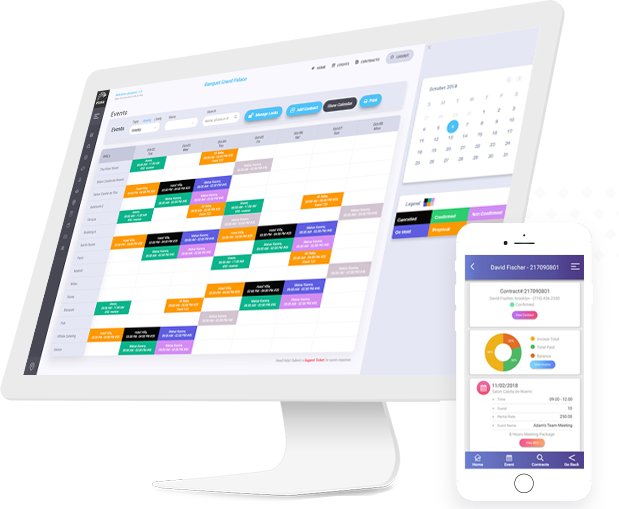The future of employee development is paved through efficient training and development programs. In order to maintain employee's involvement, efficiency and training in different ways as required, organizations now have different options available. The two platforms that make sure that essential learning content is made to be available in the world of learning technology are Learning management system (LMS) and Learning Experience Platform (LXP). Although they both have the same overall goal of promoting learning, their methods, features, and value propositions are different.
Although they both have the same main objective of encouraging learning, their methods, features, and value offerings are different. This results in raising the question -which is the right platform for you. So how would you know? Well in this blog, we’ll aim to dive in deep into the common distinctions between LMS and LXP and analyze their respective features, and thereby help you make an informed decision about which one best fits your company’s learning needs.
An Introduction to Learning Management Systems (LMS)
Designed to simplify the administration, tracking, reporting, and delivery of training programs, Learning Management System (LMS) was originally created for traditional E-learning. It covers areas such as internal policies it focus mainly on compliance and tracking
LMS platforms are now widespread in businesses of all sizes, helping them to effectively and completely manage their training efforts.
Core Features of a Learning Management System (LMS)
Course Management:
Designed around the course LMS makes sure that the organizations can upload and organize their content into learning modules, quizzes and assessments as required. Thereby enables them to create a structured program for training and can be assigned to the employees.
Tracking and Reporting:
One of the most notable features of an LMS is its capacity to track development. It gives both the managers and administrators an extensive view of learner performance by allowing them to view a full report on information like test results, course completion, and general engagement.
Compliance and Certification:
Many organizations use LMS systems to complete their duties for compliance training. For instance, automated certification production and tracking ensures that employees follow legal or industry standards.
Scalability:
An LMS is the best option for companies aiming to apply established learning across sizable groups because of its foundations in traditional education.
Deciding the Right Time to Implement an LMS
If your organization is focused on valuing efficient, systematic training then having a Learning Management System (LMS) is going to be an essential factor for you. It is especially critical when training programs require centralized control, smooth assessments, and regular updates to guarantee efficiency and consistency. With an LMS software it is possible to scale and standardize the organization's workforce and thereby give learning opportunities that are similar for all teams.
What You Need to Know About LXPs
For a long time, the only option available was an LMS where the organizations used traditional learning systems. But now, apart from the traditional system, organizations could conduct training and educational programs using an LXP.
Key Features of an LXP:
Personalized Learning:
One of the most significant features of an LXP is its ability to create personalized learning experiences. By leveraging the advantages of AI and machine learning, LXPs recommend content based on individual learning preferences, performance, and behavior. This creates a more customized journey for each learner.
Social Learning:
To facilitate employee interaction, LXPs commonly include social learning resources like forums, conversations, and social suggestions. This results in a collaborative, community-driven approach to learning.
Content Aggregation:
Articles, podcasts, videos, and outside courses are all incorporated into the learning process by an LXP. An LMS, however, mostly uses internal data. This improves the learning environment by giving employees access to a wide variety of learning opportunities from various sources.
Self-Directed Learning:
LXP enables employees to take control of their own learning journey. The platform allows users to choose what they want to learn, when they want to learn it at their own pace.
Integration with Other Tools:
Employees can take charge of their own learning paths when they have an LXP. Users may pick what they want to learn, when they want to learn it, and how quickly they want to learn it thanks to the platform.
How to Know If an LXP Is Right for You
If your organization values teamwork and aims to cultivate and maintain self-directed learning, then LXP is an ideal platform. An LXP meets your objective when it has access to a variety of information and personalized learning pathways. This is perfect for developing an active and compelling environment that is based on compliance.
Exploring the Differences Between LMS and LXP
In order to make essential decisions it is important to understand how LMS and LXP differ across various dimensions:
LMS provides a controlled and a centralized approach with its limited flexibility and administrative control over student progress and content. Whereas an LXP gives more emphasis on learner choice and provides a flexible method for evaluating the relevant information. With EventXpro offering an interactive experience, LMS offers a course centric experience that is focused on formal training materials. While LXPs place more emphasis on engagement measures, LMSs are excellent at measuring progress through completion rates and scores. In order to create a more continuous learning ecosystem, LXPs also integrate with external tools.
When it comes to choosing between LMS and an LXP there is no right answer. Every platform has its own advantages and the best option to be chosen will depend on the technological requirements and learning objectives of your organization.
An LMS is the ideal solution you should think about if your main goals include increased compliance, continuous education, and thorough reporting. However, if you are searching for a better personalized option then an LXP is probably what you should go for. Because it is an interesting, and self-directed learning environment that promotes ongoing development. It is frequently possible to combine the advantages of both an LMS and an LXP to produce a well-rounded strategy that produces an adaptable, all-encompassing learning environment.
Veuz Concepts is a leading technology provider specializing in advanced IT solutions, including Learning Management Solutions (LMS). Our LMS offerings are designed to streamline training processes, enhance efficiency, and drive digital transformation across industries. With powerful tools for course management, employee development, compliance tracking, and more, we provide automated integrations, customizable features, and seamless mobile experiences that elevate organizational performance.
With years of expertise and a proven track record of successful LMS implementations, Veuz delivers innovative, data-driven solutions that improve learning outcomes, optimize workflows, and support growth for businesses of all sizes. Trust Veuz to empower your organization with a Learning Management Solution that enables smarter training strategies, boosts employee engagement, and helps you thrive in today’s rapidly evolving business landscape.









.jpg )







Leave a comment